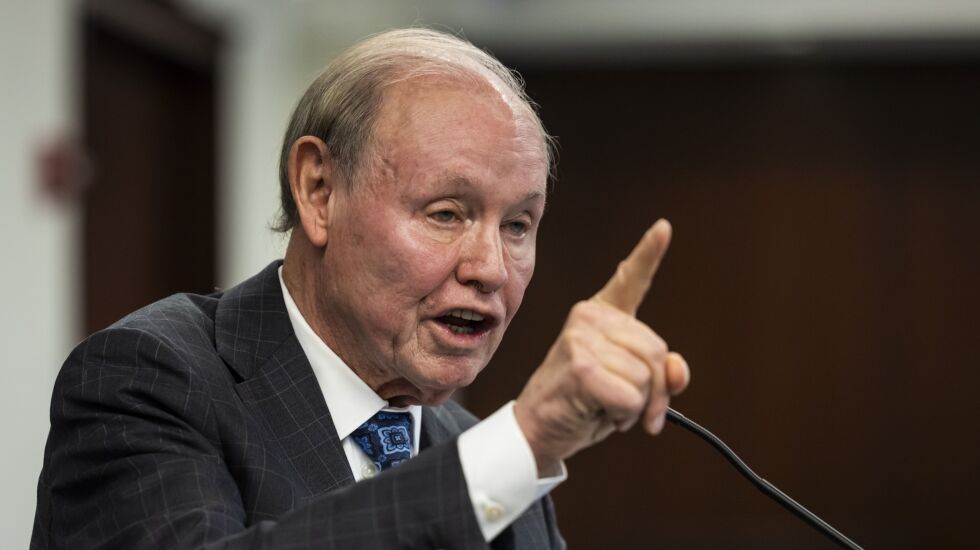
The figure is in for former Northwestern football coach Pat Fitzgerald’s long-anticipated lawsuit against the school, and it’s a big one — $130 million.
According to Fitzgerald attorney Dan Webb, the 48-year-old coach was “wrongfully and illegally terminated” by the school “without any legitimate or rational reason whatsoever.” The announcement of the 51-page lawsuit, filed in Cook County Circuit Court against the university and its president, Michael Schill, comes nearly three months after the dismissal of the Wildcats’ career leader in victories, with 101, amid a hazing scandal that became national news.
Fitzgerald is seeking the $68 million that remained on his contract and an additional $62 million in lost future income. As Webb put it during a press conference at the law offices of Winston & Strawn in the Loop at which Fitzgerald was not present, “We’ll put an expert witness on the stand to explain he’s not going to work again.”
Attorneys Webb and Matthew Carter will maneuver for further compensation for intentional infliction of emotional distress, defamation and punitive damages.
“If there was ever a coach at Northwestern University who should have not been terminated, it’s coach Fitzgerald,” Webb said.
On July 7, the school announced it had suspended Fitzgerald for two weeks without pay after an investigation by attorney Maggie Hickey, a former Illinois inspector general, into a former player’s allegations of hazing in the football program. Hickey found the whistleblower’s claims to be “largely supported by evidence” but had insufficient evidence that Fitzgerald was aware of any specific abusive acts. Fitzgerald claimed from the outset that he was unaware of any hazing.
But after an explosive story in the Daily Northwestern student newspaper detailed allegations of hazing that included nudity and sexualized acts, Fitzgerald was fired just a few days after having been suspended. Northwestern reiterated in a statement released Thursday that Fitzgerald should have known about hazing in his program and acted to end it.
“As head coach of the football program for 17 years, Patrick Fitzgerald was responsible for the conduct of the program,” the statement read. “He had the responsibility to know that hazing was occurring and to stop it. He failed to do so.”
Northwestern is facing multiple lawsuits from former football players alleging they were victims of sexual, physical and emotional hazing; a news conference for their attorneys was planned for Thursday afternoon. Also, lawsuits have been filed on behalf of athletes across other sports at the school alleging sexual and racial abuse. The school has hired former U.S. Attorney General Loretta Lynch to lead an investigation into the culture of its athletic department and its anti-hazing procedures.
According to the school’s statement, it’s “beyond question” that hazing — including “nudity and sexualized acts” — took place while the football program was on Fitzgerald’s watch.
Webb attacked the whistleblower, saying he behaved “bizarrely” during the 2022 season, “had a grudge” against Fitzgerald and “grossly exaggerated” in what he shared with the school. According to Webb, teammates of the player warned Fitzgerald the player was threatening to make “false allegations” against the coach and others.
Webb maintains there was “not much” hazing at Northwestern under Fitzgerald.
“If you put young men in a locker room, do they sometimes engage in behavior that someone could say, on a given day, they were being difficult with each other? Players sometimes do that in every locker room in America,” Webb said.
Falling back a bit fliply on an antiquated term, Webb chalked it up as “horseplay.”
“Occasionally, horseplay between young men in the locker room with no serious hazing whatsoever.”
Asked to define “horseplay,” Webb said: “Somebody may make fun of somebody or touch them — not sexually. I’m not talking about anything like that. I’m talking about slapping them or the arm or whatever, or having a fight in the shower.”
Webb indicated that current members of the Wildcats staff — some of whom wore T-shirts in support of Fitzgerald to practice at the start of training camp — likely will be called as witnesses on Fitzgerald’s behalf.







